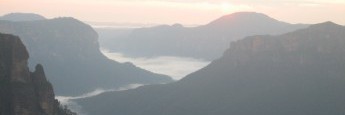
Alison:
There was a familiar scent in the air. Those trees, in blossom now, were rare. She had only ever seen them here. Their tight little white flowers appeared once a year, for a short time. She breathed deeply, standing there beside the four-wheel-drive. A peppery scent, it was. With a hint of floral sweetness. She had no idea what a botanist would call them, but she knew them as beloved friends, waiting to greet her at the end of a long day’s drive.
The light would soon be gone, and she had to make camp. But she couldn’t resist wandering over to the grove of trees huddling together near a dry creek bed, breaking off a couple of twigs in blossom, and sticking them in an empty lemonade bottle, and adding a dash of water from her canvas waterbag. She placed the bottle on the bonnet of her car, then set about making camp. Not really much to do. Pitch the small tent and throw her Thermarest and sleeping bag inside. Attach the fridge and stove to gas bottles. Find a flat spot for her table and chair. She could be here for days, so it was worth being comfortable.
Tired now, she leaned against the car, and came away daubed with red dust. The cliff she was here for sat fifty metres away. It took her breath away. Its steep sandstone walls reared up out of the quiet scrub, its veins of claystone just visible now in the late afternoon light, like spidery calligraphy against the stronger reds and yellows. Out of habit she scanned the surface for handholds, footholds, a way up. She had climbed here before, but not for a long time. Not since… well, a long time.
She thought of the ropes and carabiners neatly packed in plastic boxes. She thought of her climbing shoes, and where they had taken her. Up The Breadknife, once. That was hard. But it was good. That was with Ben, when he was still…
She breathed out impatiently and put her camp kettle on the stove to make a cup of tea. She had to get past that. She would never climb again if she couldn’t get past that terrible, terrible day. Get back on the horse, that’s what people said.
She drank her tea, and found it was dark. The stars blazed overhead in a clear sky. Tomorrow she and that cliff would talk. She didn’t want to think about it now because a twisting pain started up in her belly when she did. But tomorrow. She would climb it tomorrow.



 hrough their 50s and beyond! A compelling celebration of the laughs and lives of 21 fantastic females two of whom – Kerry Chater and Jenny Mosher – are Blue Mountains locals and will join Julie in conversation!
hrough their 50s and beyond! A compelling celebration of the laughs and lives of 21 fantastic females two of whom – Kerry Chater and Jenny Mosher – are Blue Mountains locals and will join Julie in conversation! Julie will share their journeys with you in this FREE event. Bookings are essential, please call or visit any Library branch. Call 4780 5750 for more information. Books will be for sale.
Julie will share their journeys with you in this FREE event. Bookings are essential, please call or visit any Library branch. Call 4780 5750 for more information. Books will be for sale.




